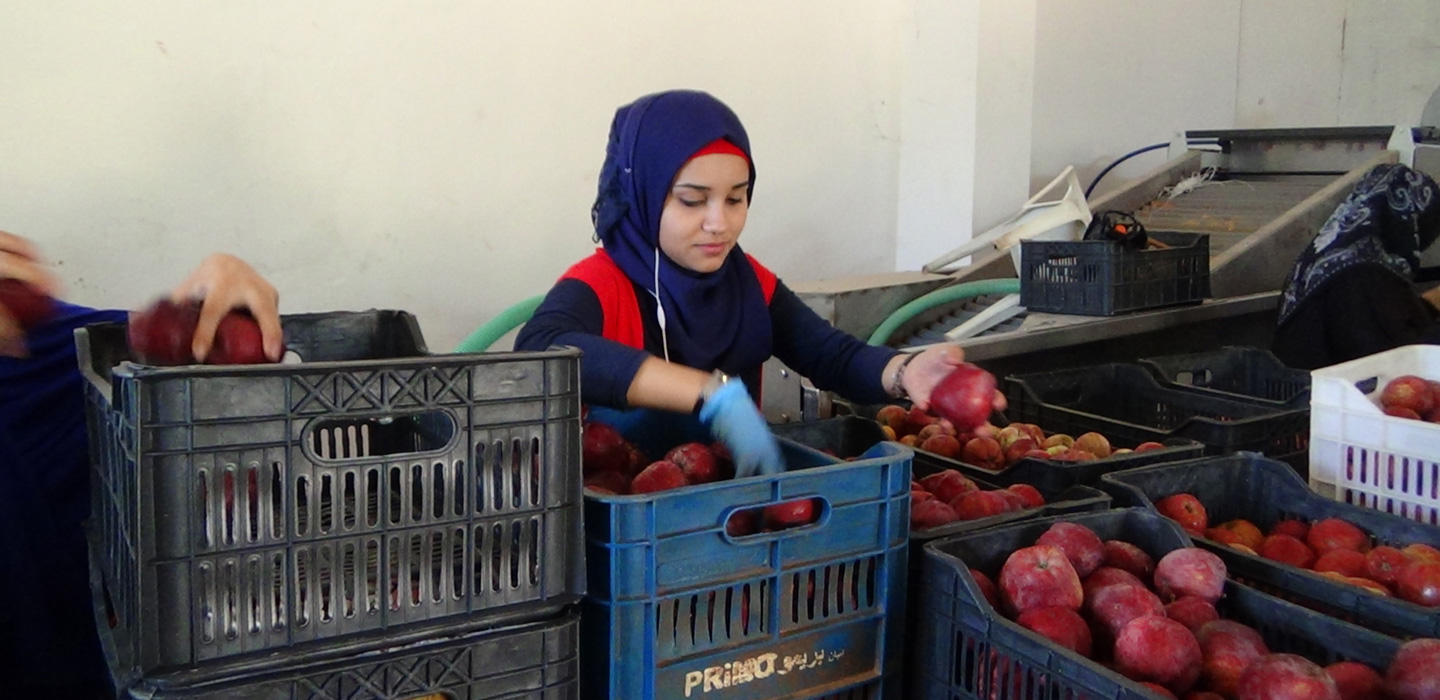Linking small-scale producers to markets in Lebanon
IFAD Asset Request Portlet
Asset Publisher
Linking small-scale producers to markets in Lebanon
Estimated reading time: 3 minutes
Apple season in Lebanon is much like apple season in many other parts of the world. The temperature drops, the trees turn rich gold and red hues, and the apple growers begin their harvest.
But in Lebanon, apple growers – along with small-scale farmers of all kinds – face a number of constraints on their ability to efficiently grow and sell their crops. Many family farmers in this area of the world benefit enormously from advice and extension services, such as training on modern agricultural techniques, but the provision of these services is highly fragmented. While some farmers can work with NGOs active in their area, others must rely on the private sellers who supply them with inputs such as seeds and fertilizers – yet these latter operations may not be qualified to provide the broad-based support these farmers need.
This same fragmentation characterizes the infrastructure – from storage and processing facilities, to transport, to information about pricing and markets – serving the agricultural value chains throughout the country. Land holdings are piecemeal as well, impeding farmers’ ability to organize and bargain for better conditions. Small-scale farmers thus find themselves relying on the wholesale market system or selling to middlemen, often fetching lower prices for their crops than what they’re worth.
Such was the case in Akkar El Attika, a small rural village in the Lebanese highlands. The apple growers there were still using traditional agricultural practices, which – despite the wealth of local knowledge they embody – aren’t well adapted to producing yields of the size and consistency necessary for sale beyond local markets. It was also difficult for them to access those other sales points in the first place, which in turn limited their access to the latest information on the current market situation and demand levels – making it nearly impossible for them to sell the right amount of crop for the right price at the right time.
That began to change in 2018, when the HASAD project, an IFAD-supported initiative dedicated to helping Lebanese small-scale farmers, came to Akkar El Attika. HASAD saw potential in the Basbina-Akkar Farmer Service Center (FSC), a local organization that had existed for some time but had long since gone idle. HASAD helped the village apple growers reactivate the FSC and introduced them to AGREEN, a Lebanese company that exports vegetables and fruits. That first season, AGREEN purchased 60 tonnes of apples from the FSC and employed a team of 18 local women to sort and process them. For Akkar El Attika, it was a great start.
This first purchase was more than a good business opportunity for all involved: it represented a trial of the public-private partnership model favored by HASAD. The project had long been aware of the fragmentation plaguing Lebanon’s agricultural system and the unevenness in farmers’ access to support, and it saw partnerships like these as the key to uniting these disparate systems.
FSCs like Basbina-Akkar are, in turn, the crucial link between small-scale farmers and final points of sale – especially for those markets that these farmers might not otherwise be able to reach. These organizations serve as a meeting place and common point of service, allowing small-scale farmers to pool their produce, resources and profits. They often provide vital post-harvest services that many farmers have little experience in, such as packaging, branding and marketing. They can also function as commercial entities of their own, thus allowing interactions between small-scale farmers and the private sector that previously were logistically impossible.
FSCs also serve as a point of access for NGOs and other organizations to provide the advice, inputs and extension services that many small-scale farmers need. In Akkar El Attika, for example, HASAD worked through the local FSC to organize practical field-based support, including trainings to help farmers improve their production practices, make use of better planting materials and crop varieties, and enhance their overall management practices on their own farms.
With the benefit of these trainings and the post-harvest services arranged by the FSC, the apple growers found the quantity and quality of their next crop was much improved, and they were able to consistently meet the quality standards required to enter wider markets. As the 2019 harvest season approached, the farmers entered into new negotiations with AGREEN – which eventually led to a full contract farming arrangement between the company and the farmers. In September 2019, AGREEN purchased another 60 tonnes of apples. They sold some on the domestic market and exported the rest as far as Jordan and Egypt, netting the farmers a vastly improved income.
In Akkar El Attika and all throughout HASAD’s project area, the public-private partnership model is proving to be both effective and cost-efficient. Local farmers are enjoying more efficient growing and harvesting techniques, improvements in the quantity and quality of their yields, and access to the support they need – both before and after the harvest.
Learn more about IFAD’s work in Lebanon
Publication date: 16 November 2020